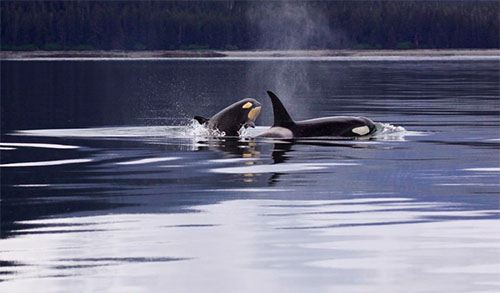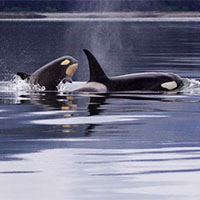— from iPolitics.ca —

Although the [Canadian] National Energy Board acknowledges the Trans Mountain expansion project will have “significant adverse environmental effects” on critically endangered Southern resident killer whales and produce considerable greenhouse gas emissions, it said [February 22] that it’s in Canadian public interest and should be approved.
On Friday, the board delivered its reconsideration report to the federal government and announced the findings at a press conference in Calgary.
The NEB will impose 156 conditions on the project if it is approved, and has made 16 new recommendations to the government.
The green light comes even though the report “concludes that project-related marine shipping is likely to cause significant adverse environmental effects on the Southern resident killer whale, as well as Indigenous cultural use associated with (the orca),” said Dr. Robert Steedman, the board’s chief environment officer.
The NEB also found that greenhouse gas emissions from marine vessels related to the project “would likely be significant.”
And while a worst-case spill from the project is not likely, Steedman said, “if it were to occur the environmental effects would be significant.”
However, the board decided the risks can be “can be justified in the circumstances, in light of the considerable benefits” and the measures it is recommending to mitigate those risks and impacts.”
The justifications, as the board sees it, include increased access to markets for Canadian oil, jobs created across Canada, direct spending on pipeline materials and revenues.
“They can justify harm to our orcas. Are they saying they can justify the harm to our life,” Chief Judy Wilson of the Union of British Columbia Indian Chiefs (UBCIC ) said during a press conference in Vancouver.
“They’re not even listening to our orcas. They’re in crisis. If it’s a vote between the tankers and the orcas, I vote for the orcas. We have inherent rights and we’ll continue to stand up for them.”
At the same press conference, Eugene Kung, a lawyer West Coast Environmental Law, said given the limited scope of the board’s review, which didn’t consider salmon-spawning streams that provide food for orcas or look at their critical habitat, “the fix was in on this from the start.”
“This decision amounts to a death sentence for orcas,” he said.
READ FULL ARTICLE: https://ipolitics.ca/2019/02/22/neb-says-trans-mountain-is-in-public-interest-despite-threat-to-resident-orcas/
PREVIOUS ORCAS ISSUES STORIES: https://theorcasonian.com/?s=trans+mountain&x=0&y=0
**If you are reading theOrcasonian for free, thank your fellow islanders. If you would like to support theOrcasonian CLICK HERE to set your modestly-priced, voluntary subscription. Otherwise, no worries; we’re happy to share with you.**









This is a political decision; the economics do not pencil out in favor of tripling the capacity of the Trans Mountain Pipeline. Demand for Alberta’s Tar Sands crude oil will be falling soon because of a new rule that requires the sulfur content of marine fuels to go from a maximum of 3.5% to 0.5%. Tar Sands crude has among the highest sulfur content of any crude oil. The demand for Canadian crude is projected to fall 20% as January 1, 2020, the date for implementation of the new rule approaches. The decision of Trudeau’s government to purchase the existing Trans Mountain Pipeline from Kinder Morgan will be a money looser in the long run.
Well, you can bet that somebody makes money off of these behemoth deals… somewhere. I cringe everytime I hear that men in suits have made decisions behind closed doors that are in our best interests. Sad news… thanks for posting.